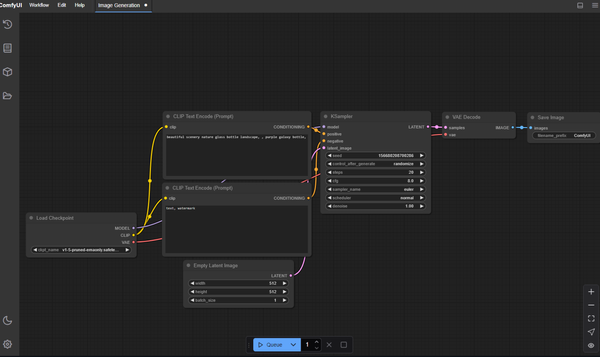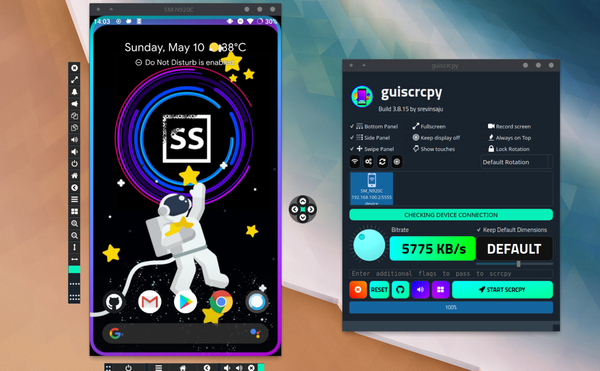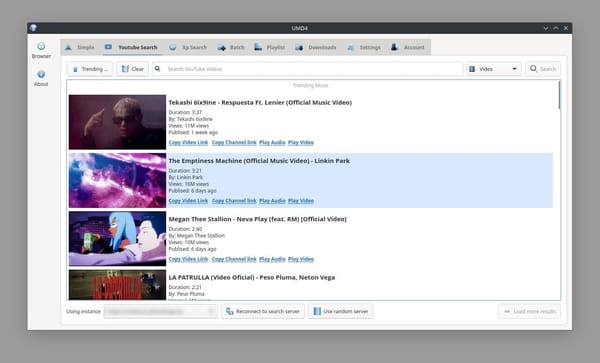15 Free Open-source Linux Firewall
Table of Content
A firewall is a security tool that monitors and controls incoming and outgoing network traffic based on predetermined security rules. It acts as a barrier between a trusted internal network and untrusted external networks, such as the internet. Firewalls are essential for protecting systems from unauthorized access, cyber threats, and malicious attacks.
Why You Need a Firewall on a Linux System
Whether you are using a Linux system at home, in a company, office, or enterprise environment, having a firewall is crucial for several reasons:
1. Protection Against Unauthorized Access
Firewalls are the first line of defense against unauthorized access to your network and systems. By monitoring network traffic, firewalls can block suspicious activity and prevent hackers from exploiting vulnerabilities in your system. This protection is essential for safeguarding sensitive data and maintaining the integrity of your network.
2. Preventing Malicious Attacks
Cyber threats, such as malware, ransomware, and phishing attacks, are constantly evolving. Firewalls help prevent these attacks by blocking malicious traffic and restricting access to harmful websites or IP addresses. This protection is vital for preventing data breaches and ensuring the security of your information.
3. Control Over Network Traffic
Firewalls provide granular control over network traffic, allowing you to define rules for what is allowed and what is blocked. This control is beneficial for managing bandwidth, prioritizing critical applications, and preventing unauthorized users from accessing specific network resources.
4. Compliance and Security Policies
For companies and enterprises, complying with industry regulations and security policies is a top priority. Firewalls help ensure compliance by enforcing security measures and logging network activity. This accountability is essential for audits and demonstrating adherence to legal and regulatory requirements.
5. Enhanced Privacy
In a home or office setting, privacy is a major concern. Firewalls can help maintain privacy by preventing unauthorized access to your personal or sensitive information. They can also block intrusive advertisements and trackers, enhancing your overall browsing experience.
Free Open-Source Linux Firewalls
1- Iptable
In Linux systems, firewall features are managed by netfilter app. Which is a kernel module that manages which packets are allowed to go in and out.
Iptable is a command-line app for your local Linux Firewall which is netfilter.
It allows users to define rules for how incoming, outgoing, and forwarded network traffic should be handled. These rules can specify conditions based on IP addresses, protocols, ports, and other packet attributes to either accept, reject, or drop packets.
Iptables is a vital tool for securing Linux systems, enabling the creation of custom firewall configurations to control network access and protect against unauthorized activities.
2- UFW or Uncomplicated Firewall
This app is a simple user-friendly interface to manage iptables on Linux systems.
It uses a simple command-line interface that allows users to allow or deny traffic based on specific conditions like IP addresses, ports, and protocols.
UFW is especially useful for users who need basic firewall functionality without needing to delve into the more advanced options provided by iptables.
3- nftables
Nftables is a packet filtering framework in the Linux kernel that replaces the older iptables, ip6tables, arptables, and ebtables. It provides a unified interface for managing network filtering and classification rules. Nftables uses a simpler, more flexible syntax than iptables and offers better performance and scalability by handling all types of network protocols in one utility.
It allows users to define rules for packet filtering, NAT, and other network operations.
4- Gufw
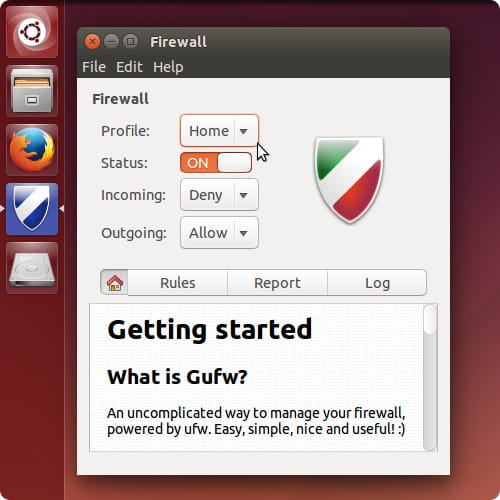
This is a free open-source user-friendly graphical user interface for Ubuntu's Uncomplicated Firewall (UFW).
5- OPNsense

OPNsense is an open-source firewall and routing platform that provides easy-to-use network security solutions. Built on FreeBSD, it offers a user-friendly web interface for managing firewall rules, routing, VPNs, traffic shaping, and more.
OPNsense includes features like intrusion detection and prevention, two-factor authentication, and support for plugins, making it a versatile choice for both home and enterprise networks. It aims to provide robust security with a focus on simplicity and reliability.
6- BrazilFW Firewall and Router
BrazilFW is a lightweight, open-source Linux distribution designed for use as a router and firewall.
It aims to provide an efficient and straightforward solution for setting up a network firewall and router, especially on older or less powerful hardware.
BrazilFW features a minimalistic interface for managing network services, firewall rules, bandwidth control, and VPNs.
Its compact size makes it ideal for users seeking a simple yet effective network security solution without needing advanced hardware resources.
7- IPCop Firewall

The IPCop Firewall is a Linux firewall distribution. It is geared towards home and SOHO users. The IPCop web-interface is very user-friendly and makes usage easy.
However, it is important to note that the project is abandoned.
8- OpenGFW
OpenGFW is an open-source program for Linux that allows users to create their own network filtering system, akin to the Great Firewall of China. Designed with flexibility and ease of use in mind, OpenGFW provides a powerful toolset for individuals who want to take control of their network's traffic.
By implementing a range of filtering and blocking rules, OpenGFW can be used to enforce ad blocking, parental controls, malware protection, and prevent abuse of VPN or proxy services. It offers traffic analysis in a log-only mode, enabling users to monitor network activity without actively blocking it, making it suitable for educational purposes or for those who simply want to better understand their network's usage patterns.
The concept behind OpenGFW is to "democratize censorship," allowing users to decide what content is accessible on their networks. While this can be seen as empowering for individuals who want to ensure a safe browsing environment for their families or organizations, it also raises ethical questions about censorship and control.
OpenGFW is marketed with a sense of irony, encouraging users to "fulfill their dictatorial ambitions" by giving them the tools traditionally used by governments for internet censorship.
However, it also serves legitimate purposes, such as enhancing cybersecurity, enforcing content policies, and protecting against unwanted or harmful online activity. By bringing the capabilities of large-scale network control into the hands of everyday users, OpenGFW invites a conversation about the balance between freedom and security in the digital age.
Features
- Full IP/TCP reassembly, various protocol analyzers
- HTTP, TLS, QUIC, DNS, SSH, SOCKS4/5, WireGuard, OpenVPN, and many more to come
- "Fully encrypted traffic" detection for Shadowsocks, VMess, etc.
- Trojan (proxy protocol) detection
- [WIP] Machine learning based traffic classification
- Full IPv4 and IPv6 support
- Flow-based multicore load balancing
- Connection offloading
- Powerful rule engine based on expr
- Hot-reloadable rules (send
SIGHUPto reload) - Flexible analyzer & modifier framework
- Extensible IO implementation (only NFQueue for now)
9- Advanced Policy Firewall (APF)
Advanced Policy Firewall (APF) is an open-source firewall management tool for Linux systems, available on GitHub. It provides a simple and intuitive interface for configuring firewall rules and managing network security policies.
APF is designed to be user-friendly while offering advanced features like dynamic rule sets, inbound and outbound traffic filtering, and support for various network protocols.
It also includes anti-DDoS protection and other security enhancements to help protect servers and networks from unauthorized access and attacks. APF is ideal for administrators looking for a robust yet easy-to-manage firewall solution.
Advanced Policy Firewall (APF) Features:
- Detailed and well-commented configuration file
- Granular inbound and outbound network filtering
- User ID and application-based network filtering
- Trust-based rule files with advanced syntax options
- Global trust system for centralized rule management
- Reactive Address Blocking (RAB) for intrusion prevention
- Debug mode for testing features and configurations
- Fast load feature for loading 1000+ rules quickly
- Independent configuration of inbound and outbound interfaces
- Global TCP/UDP port and ICMP type filtering with multiple execution methods
- Configurable policies for each IP with convenience variables
- Packet flow rate limiting for abuse prevention
- Prerouting and postrouting rules for network performance optimization
- DShield.org and Spamhaus block list support for banning suspicious networks
- Configurable firewalled and trusted interfaces with unique policies
- Intelligent route verification and advanced packet sanity checks
- Filtering of attacks like fragmented UDP, port zero floods, and ARP poisoning
- Configurable type of service options for traffic prioritization
- Dynamic configuration of local DNS resolvers into the firewall
- Optional filtering for P2P applications, private IP addresses, and ident service
- Configurable connection tracking for network scalability
- Kernel hooks for protection against SYN-flood attacks and routing abuses
- Advanced network controls, including congestion notification and overflow control
- Special chains for FTP DATA and SSH connection state awareness
- Adjustable rate of logged events
- Logging subsystem for detailed rule and error reporting
- Support for creating custom rules for advanced users familiar with netfilter
- Pluggable QoS algorithm support for enhanced traffic management
10- Smoothwall Express
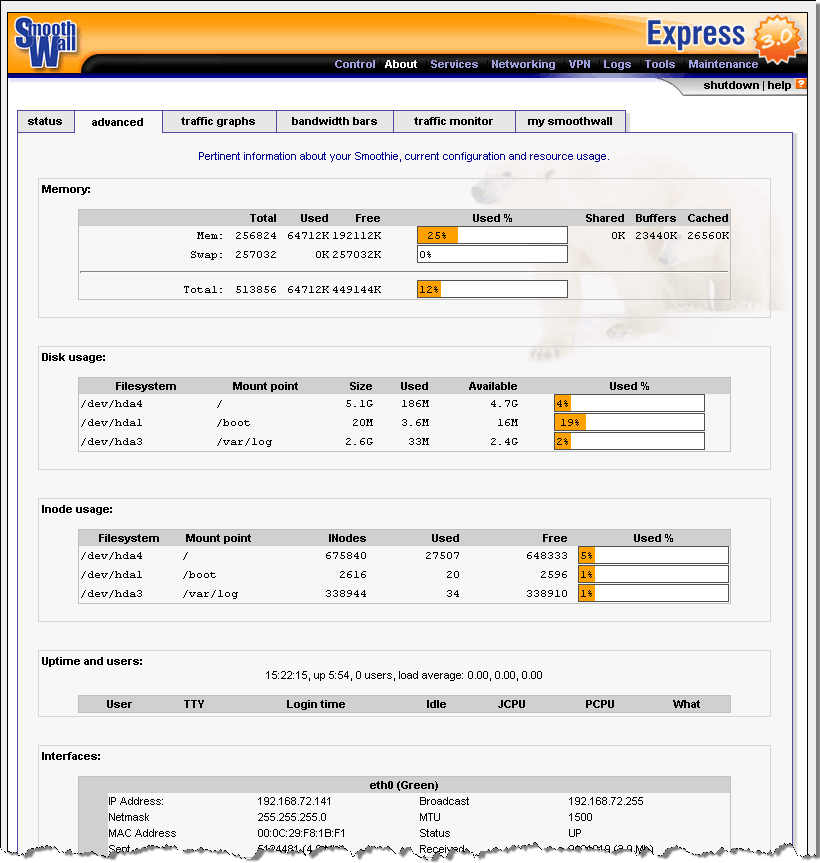
Smoothwall is an open-source Linux-based firewall designed to provide network security and protection.
It offers an easy-to-use web interface for managing firewall rules, monitoring traffic, and configuring network settings. Smoothwall includes features like intrusion detection, VPN support, web content filtering, and bandwidth management.
It is suitable for both home and enterprise environments, offering robust security features to protect against threats and manage network traffic effectively. Smoothwall is known for its reliability, flexibility, and straightforward setup, making it a popular choice for users looking for a comprehensive firewall solution.
Built using open source and Free software, it's distributed under the GNU Public License.
11- OpenSnitch

OpenSnitch is a port of the Little Snitch firewall for GNU/Linux, designed to monitor and control network connections.
It operates by intercepting outgoing connections and prompting the user to allow or deny them. Users can view all intercepted connections and processes through a graphical user interface (GUI) and create rules to permanently allow or deny specific connections.
Temporary rules can be converted to permanent ones, providing flexibility in managing network access. The OpenSnitch UI connects via a local Unix socket by default, offering a detailed view of network activity and customizable security settings.
The project is a truly open-source project that is released under the GPL-3.0 License.
It is available for Debian and RedHat-based distros. It is also can be installed on Arch Linux and Arch-based distros.
Features of OpenSnitch
- Some processes are part of the GNU/Linux ecosystem
- See and modify the rules accumulated
- Convert temporary rules to permanent
- Block everything by default and allow only those processes or connections that you want to
- Configure the default action to Allow
- View the details of a process, rule, host or user
12- minifirewall
minifirewall is a simple packet filtering firewall, written in C, for GNU/Linux based systems. It uses Netfilter's hooks to watch the inbound and outbound packets of a computer in a network.
13- Douane
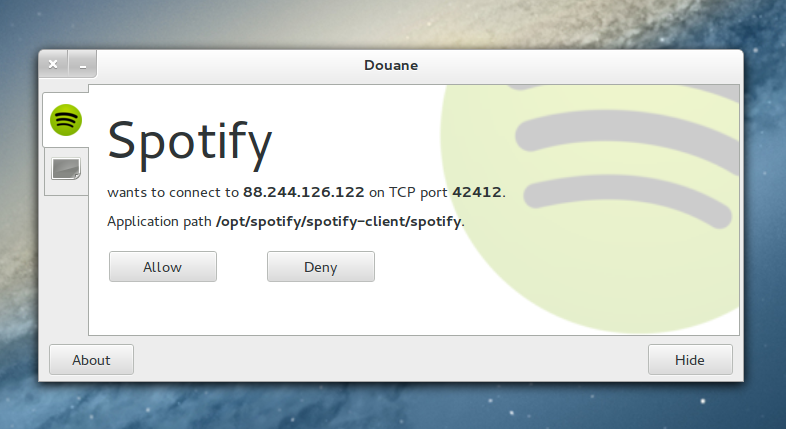
Douane is an open-source firewall application for Linux designed to provide interactive control over outgoing network connections. It acts as a security layer between the user’s applications and the network, prompting users to allow or deny outbound connections, thereby giving them control over what data their applications can send over the internet.
Douane is an ideal firewall for users looking to have detailed control over their network connections and enhance their system’s security by monitoring and managing outgoing traffic on Linux.
Douane Features
- Interactive Connection Control: Douane intercepts outgoing network connections and prompts the user to allow or deny each connection, offering real-time control over network traffic.
- Application-Based Filtering: Users can create rules based on specific applications, determining which applications are allowed to connect to the internet and under what conditions.
- User-Friendly Interface: The firewall provides a simple and intuitive graphical interface for managing rules and monitoring network activity, making it accessible even for less experienced users.
- Customizable Rules: Users can define permanent or temporary rules for network access, giving flexibility in managing network permissions based on current needs.
- Daemon and Kernel Module: Douane consists of a user-space daemon and a kernel module, ensuring efficient and secure monitoring of outgoing traffic.
- Real-Time Notifications: It provides instant notifications for any connection attempts, keeping users informed of all network activity and potential threats.
- Cross-Distribution Support: Douane is designed to work across various Linux distributions, making it a versatile choice for Linux users.
14- LAF
Linux Application Firewall (LAF) is an application firewall for Linux. It allows users full control over which applications are allowed to communicate over the network.
15- Firewalld
Firewalld is a powerful and flexible firewall management solution for Linux systems. It provides a dynamic interface for managing firewall rules, offering a more advanced alternative to traditional static firewalls.
Firewalld uses zones and services to define the trust level of network connections, allowing users to create and apply rules based on the security requirements of different network environments.
Firewalld is widely used in enterprise environments for its robust security features and flexibility, making it an ideal choice for system administrators looking to enhance their network security posture on Linux systems.
Features of Firewalld
- Dynamic Firewall Management: Firewalld allows for real-time adjustments of firewall rules without disconnecting or disrupting existing connections, ensuring continuous protection and adaptability.
- Zone-Based Configuration: It uses zones to define levels of trust for network connections, making it easy to apply different security policies to different parts of the network.
- Service-Based Rules: Users can define rules based on network services, simplifying the management of network traffic by associating services with predefined ports and protocols.
- Rich Language Support: Firewalld supports a rich rule language that provides detailed control over traffic, including support for IP masquerading, port forwarding, and logging.
- IPv4 and IPv6 Support: The firewall supports both IPv4 and IPv6, ensuring compatibility and security across different types of network configurations.
- Integration with NetworkManager: Firewalld integrates seamlessly with NetworkManager, enabling automatic application of firewall rules based on network changes.
- Graphical and Command-Line Interfaces: It offers both graphical and command-line interfaces, catering to different user preferences and skill levels.
Conclusion
Firewalls are an essential component of network security, providing protection against unauthorized access, malicious attacks, and ensuring compliance with security policies. Whether you are securing a home network, office, or enterprise environment, choosing the right open-source Linux firewall can enhance your network's security and protect your valuable data.
With a wide range of options available, you can find a firewall solution that fits your specific needs and provides the security features necessary to keep your network safe.




